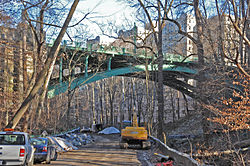Klingle Valley Bridge
Klingle Valley Bridge | |
 Connecticut Avenue Bridge from Klingle Road | |
| Location | Washington, D.C. |
|---|---|
| Coordinates | 38°55′56″N 77°3′24″W / 38.93222°N 77.05667°W |
| Built | 1932 |
| Architect | Paul Philippe Cret Ralph Modjeski |
| Architectural style | Art Deco |
| Part of | Cleveland Park Historic District (ID87000628) |
| NRHP reference No. | 04000448 |
| Significant dates | |
| Added to NRHP | May 21, 2004[1] |
| Designated CP | April 27, 1987 |
The Kingle Valley Bridge, officially known as the Connecticut Avenue Bridge, is an Art Deco steel-arch bridge located near the National Zoological Park on Connecticut Avenue, Northwest in Washington, D.C. The bridge crosses Klingle Valley, running from Macomb Street to Devonshire Place and connecting the Cleveland Park and Woodley Park neighborhoods.[2]
The bridge replaced an earlier one built around 1890 by real estate developer and sitting U.S. Representative Francis Newlands, D-Nevada, as part of his effort to create the streetcar suburb of Chevy Chase, Maryland.[3]
The bridge was designed by architect Paul Philippe Cret and engineer Ralph Modjeski. It was built in 1931–1932. There is no direct connection between Connecticut Avenue and Klingle Road in the narrow valley below. The bridge features two historic lights on each corner. A major rehabilitation of the bridge that began in 2005 included restored ornamental lanterns, refurbished masonry, and additional street lights. The restoration project was completed in 2008.[4][5]
On May 21, 2004, the bridge was added to the National Register of Historic Places.[4][6] It is a contributing property to the Cleveland Park Historic District.[5]
See also
- List of bridges documented by the Historic American Engineering Record in Washington, D.C.
- List of bridges on the National Register of Historic Places in Washington, D.C.
- National Register of Historic Places listings in the District of Columbia
References
- ^ "National Register Information System". National Register of Historic Places. National Park Service. March 13, 2009.
- ^ Kimberly Prothro Williams (September 1, 2001). "The Cleveland Park Historic District" (PDF). D.C. Preservation League. Government of the District of Columbia. Archived from the original (PDF) on July 18, 2009. Retrieved July 16, 2009.
- ^ French, Roderick S. (1973). "Chevy Chase Village in the Context of the National Suburban Movement, 1870-1900". Records of the Columbia Historical Society, Washington, D.C. 49: 300–329. ISSN 0897-9049. JSTOR 40067746.
- ^ a b "Mayor Williams and Community Relight Historic Lights on Connecticut Ave. Bridge over Klingle Valley". District of Columbia Department of Transportation. December 31, 2003. Archived from the original on September 30, 2006. Retrieved June 5, 2008.
- ^ a b "District of Columbia – Inventory of Historic Sites" (PDF). Government of the District of Columbia. September 1, 2004. Archived from the original (PDF) on July 17, 2009. Retrieved July 16, 2009.
- ^ "District of Columbia – District of Columbia". National Park Service. June 5, 2008. Retrieved July 16, 2009.
External links
- Historic American Engineering Record (HAER) No. DC-27, "Connecticut Avenue Bridge, Spanning Klingle Valley"
- National Register of Historic Places
- Two Die When Car Plunges Off Connecticut Ave. Bridge
- Art Deco architecture in Washington, D.C.
- Bridges completed in 1932
- Road bridges on the National Register of Historic Places in Washington, D.C.
- Paul Philippe Cret buildings
- Historic American Engineering Record in Washington, D.C.
- Individually listed contributing properties to historic districts on the National Register in Washington, D.C.
- Open-spandrel deck arch bridges in the United States
- Steel bridges in the United States
- 1932 establishments in Washington, D.C.
- Washington, D.C., Registered Historic Place stubs
- Washington, D.C., building and structure stubs
- Southern United States bridge (structure) stubs

